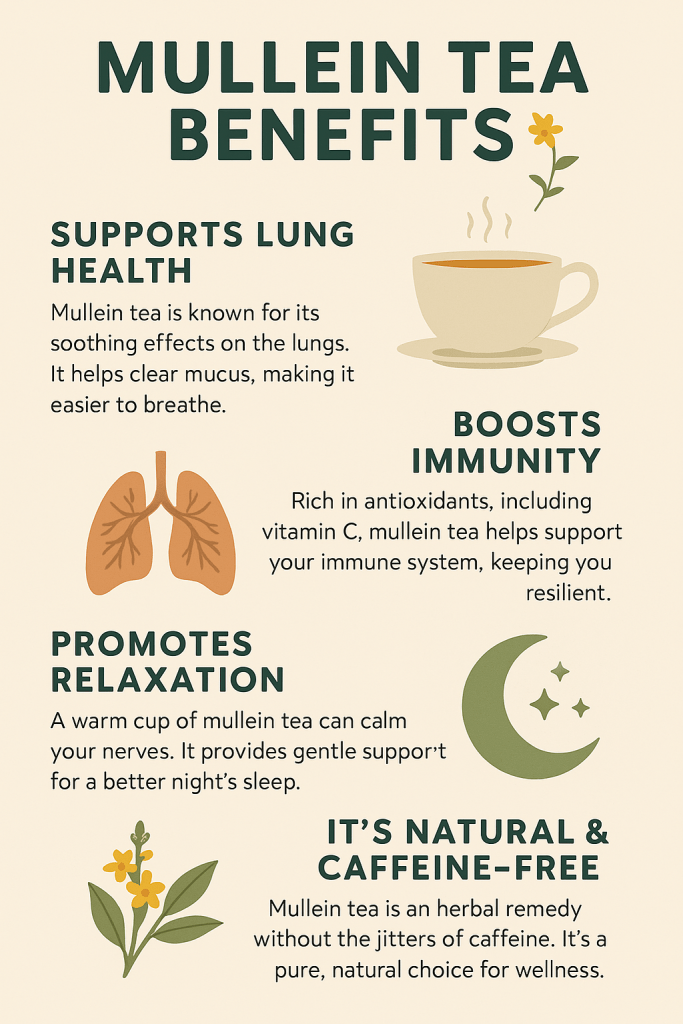Mullein Tea Benefits: Breathe Easier with This Herbal Classic
Mullein tea benefits might not be the first thing you think of when your throat’s sore or your lungs feel heavy. However, this humble herb has a lot more to offer than most people realise.
In a world crammed with synthetic syrups and medicated lozenges, mullein stands out as a gentle, natural alternative. It’s an old-school remedy that still pulls its weight — especially when the seasons change or the sniffles start.
What Is Mullein, Exactly?
Mullein (Verbascum thapsus) is a tall, woolly plant with yellow flowers that grows wild in Europe, Asia, and North America. You’ve probably walked past it without even knowing — those towering stalks can reach six feet high! That’s part of what makes it such a standout in a meadow.
The leaves and flowers are the stars here. They’re dried and brewed into teas or used in herbal blends. Despite its rugged look, mullein is surprisingly gentle. Thanks to its soft, fuzzy leaves, it’s long been used to calm irritation in the lungs and throat. While mullein supports the lungs, avocado leaves also offer gentle respiratory relief.
Why People Turn to Mullein Tea for Lungs
The most well-known mullein tea benefits focus on the lungs. Whether it’s a dry cough, a raspy throat, or just that heavy-chested feeling, mullein tea can be a breath of fresh air — literally.
- Soothes irritation: Its demulcent action coats the throat and respiratory tract.
- Clears mucus: Acts as a mild expectorant to help expel congestion.
- Reduces inflammation: Helps calm swollen airways and ease discomfort.
Because of these combined actions, many herbalists recommend it for coughs that linger too long or for those needing extra lung support, especially during the colder months.
What Makes Mullein So Effective?
Mullein’s magic comes from a unique combo of plant compounds that work together beautifully. Each one plays a key role in helping the body find relief:
- Saponins – Loosen and break down mucus.
- Mucilage – Provides a soothing, protective layer.
- Flavonoids – Fight inflammation and support overall healing.
- Tannins – Mildly astringent, they help tone tissues.
Together, they create a balanced herbal experience that targets discomfort without overwhelming your system. That’s why it’s a favourite among herbalists for respiratory relief.
Beyond the Lungs: Other Mullein Tea Benefits
Mullein isn’t a one-trick herb. While its respiratory support gets the spotlight, it offers a few extra perks you might not know about:
- Ear support: Mullein-infused oil is often used for ear discomfort.
- Better sleep: Its calming effect may help you unwind before bed.
- Immune boost: Antioxidants in the plant help the body stay resilient.
- Bladder ease: Traditionally used for urinary irritation too.
Furthermore, it’s not just folklore — growing interest in herbal research backs up many of these traditional uses.
How to Brew Mullein Tea Properly
Making mullein tea is easy, but there’s one key tip: always strain it well. Those tiny hairs on the leaves can irritate your throat if left behind.
Here’s how to brew it:
- Add 1–2 teaspoons of dried mullein leaves or flowers to a tea infuser.
- Pour over 250ml of freshly boiled water.
- Let it steep for 10–15 minutes.
- Strain thoroughly — you want a smooth, clear cup.
You can enjoy 1–3 cups a day during cold season or whenever you need lung support. Add honey or peppermint for a tastier twist. Some people even blend it with other herbs for a more rounded tonic.
What Does the Research Say?
Although mullein hasn’t had as much mainstream attention as other herbs, there’s growing evidence that supports its traditional uses. Studies suggest its demulcent and anti-inflammatory actions may indeed help ease respiratory discomfort.
Many herbal guides and emerging scientific research point to its gentle but effective support for the lungs, especially when used consistently.
Is Mullein Tea Safe?
For most people, mullein is considered very safe. Still, it’s always good to keep a few things in mind:
- Strain it well: This can’t be stressed enough — avoid those tiny hairs!
- Pregnant or breastfeeding? Best to check with a qualified herbalist first.
- Taking meds? Have a quick word with your GP about any possible interactions.
It’s always smart to do your own research and listen to your body.
Final Thoughts: Should You Try Mullein Tea?
If your lungs have been working overtime lately — whether from smoke, allergens, or general life stress — mullein tea is a comforting, natural option. It’s not dramatic, but it is effective. The gentle herbal support it offers could be just what your body needs to recover and reset.
So next time your breathing feels off, reach for this old herbal favourite. A simple cup of mullein tea might be the most comforting thing you’ll drink all day. You might even come to rely on it throughout the year.
The Lungwort plant is also a great help for your lungs. And as been used for ever in herbal medicine because of its amazing benefits.






